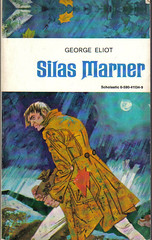
Silas Marner by George Eliot is another one of those Scholastic bookclub books I bought back in elementary school, moved around with me for 18 years or so, and then finally got around to reading. How could I have resisted this cover for so long? (check out the back as well, complete with nifty cobwebs.)
This story involves the weaver Silas Marner, wronged by his friends and forced to leave his hometown to take up his trade amongst strangers. He isn't very sociable, and turns toward the gold he earns from weaving for comfort, slowly hording it up and gaining a reputation as a miser. But then one night, Silas comes home and finds that all his precious gold has been stolen! This changes everything for Silas and the village in a whole variety of ways. This is a pretty moralistic and romantic tale (it is George Eliot after all), but its filled with lots of comeuppance, apt description, and funny bits as well. Here are a few of my favorites (sorry there are so many, I was really into this one...)
The perfect description of moving to a new place where you don't know anyone: “Even people whose lives have been made various by learning, sometimes find it hard to keep a fast hold on their habitual views of life, on their faith in the Invisible, nay, on the sense that their past joys and sorrows are a real experience, when they are suddenly transported to a new land, where the beings around them know nothing of their history, and share none of their ideas -- where their mother earth shows another lap, and human life has other forms than those on which their souls have been nourished.”
I know these people: “Assuredly, among these flushed and dull-eyed men there were some whom -- thanks to their native human-kindness -- even riot could never drive into brutality; men who, when their cheeks were fresh, had felt the keen point of sorrow or remorse, had been pierced by the reeds they leaned on, or had lightly put their limbs in fetters from which no struggle could loose them; and under these sad circumstances, common to us all, their thoughts could find no resting-place outside the ever-trodden round of their own petty history.”
Aren't all parties kind of like this at the beginning?: “The conversation, which was at a high pitch of animation when Silas approached the door of the Rainbow, had, as usual, been slow and intermittent when the company first assembled. The pipes began to be puffed in a silence which had an air of severity; the more important customers, who drank spirits and sat nearest the fire, staring at each other as if a bet were depending on the first man who winked; while the beer-drinkers, chiefly men in fustian jackets and smock-frocks, kept their eyelids down and rubbed their hands across their mouths, as if their draughts of beer were a funereal duty attended with embarrassing sadness.”
No comments:
Post a Comment